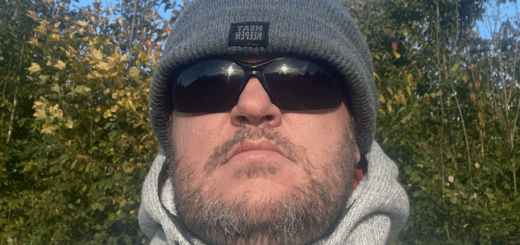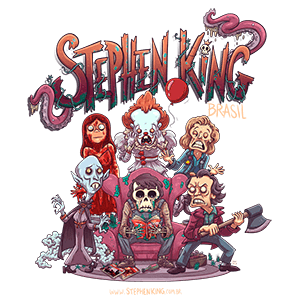Graham Rees

He is the writer of the stage adaptation The Boogeyman.
SKSM: Tell us about yourself, who is Graham Rees and what do you do or have you done?
Graham Rees: I am ultimately a failed artist who dreamed of being a writer/director, when I realised that I was far too self-conscious to be an actor. I studied Contemporary Arts to a Masters level, specialising in Stage Adaptation in the Collaborative Ensemble, which, as you can well imagine, led to zero job prospects on graduation. I tried my hand as a University drama lecturer for two year, but I was always too anarchic and outspoken to be a suitable role-model for students, or I was just crap at it, you decide. I taught drama to people with special educational needs for three years, which was awesome, but I no longer work in the arts anymore. I am still a writer, of sorts, but I write for pleasure and without an audience in mind.
SKSM: When was the point of I’d like to make a Dollar Baby but on stage?
Graham Rees: I don’t know if we were familiar with the Dollar Baby when we originally applied to SK for the rights to The Boogeyman. It was a bit of a shot in the dark, as we had never applied for the rights to anything before, we had always produced original work. My company co-director and Deputy Stage Manager, Geoff Sims, wrote to SK in 2005 at his home address, and the positive reply was a bit of a shock. I don’t think we expected to hear anything. I now know what a great, friendly, supportive-of-budding-young-artists type of guy SK is, but at the time we didn’t know anything. We are British, and SK is probably the world’s most famous living writer, then and now. To get a personal response and for the bargain price of $1 was amazing. I wish I still had the letter, but I don’t. I guess Geoff still has it, but I haven’t heard from him now for many years. If I had the letter now, I would frame it. We did write to SK again a year later and ask for the rights to another of his short stories, In The Deathroom, from Everything’s Eventual. But SK wrote back and said he didn’t have the rights to that anymore. I never saw an adaptation of In The Deathroom, so I don’t know who does have the rights. I sent SK a finished copy of my theatrical adaptation of The Boogeyman, but I have no idea if he read it. I would assume not. I hope he kept it on a shelf somewhere though. That would be cool.
SKSM: Where and when was The Boogeyman made. Can you tell us something about the production? (How much did it cost? How long did it take to make it?)
Graham Rees: I first became aware of The Boogeyman, and of SK in general, whilst watching TV late at night around the year 2000. I happened to catch the 1990 film adaptation of Graveyard Shift with Stephen Macht. In retrospect, it was quite an unlikely way to get into SK, I imagine for most people it would have been Carrie, or The Shining, or The Shawshank Redemption. But I never saw them, I saw Graveyard Shift. I really liked the basements within basements within basements, and the gigantic pile of human bones (which, incidentally, does not appear in the original story). I also loved the Maine accents; specifically Macht, saying “Show’s ov-AH!” The whole thing was delightfully odd and creepy as hell. I went out the next morning and bought the book. Graveyard Shift is a very short story in the anthology, Night Shift. I was ultimately disappointed in the Graveyard Shift story, but loved many of the others, especially Strawberry Spring, One For The Road and, of course, my absolute favourite, The Boogeyman.
Incidentally – I can never remember whether it is ‘Bogeyman’ or ‘Boogeyman’ in the original. We always spelt it ‘Boogeyman’, with two O’s. A bogey in Britain is nose detritus. A Bogeyman to me is just a big green glob of goo. A Boogeyman is much scarier.
I think it took perhaps 6-12 months to put together, and it couldn’t have cost us much, as we didn’t have any money.
SKSM: Can you explain why you specifically chose this story to make a stage adaptation?
Graham Rees: The Boogeyman is my absolute favourite short story, and short stories lend themselves so well to adaptation because you can stay faithful to the original without jettisoning too much of the detail and premise, but there is also scope for your own ideas. When writing an adaption, I try and match the original artist’s voice and style, and compliment it, if I can, with my own ideas, and make the transition between my own work and theirs to be seamless enough that you cannot see the change. I haven’t reread the original story now in many years, but, reading the 2005 adaptation again recently in order to answer these questions, I find it hard to remember exactly where SK’s work ends and mine begins, and that is the ultimate aim of the adaptation, in my opinion.
SKSM: Why do you think people like this story so much?
Graham Rees: I cannot speak for anyone else, but I found it scary as hell. The protagonist is a racist, wife-beating arsehole, but is also sympathetic, which highlights SK’s skill at creating nuanced characters. It is a character-driven piece, like all of SK’s work. I also like the fact that it is not ambiguous. It was tempting, when writing the adaptation, to perhaps suggest that Billings, the protagonist whose three children are all killed, is actually the one responsible for their deaths, but no. It’s called The Boogeyman, and it was the Boogeyman that killed them. How terrifying is that? There’s another SK story I love, called The Night Flier, where the people in the story are killed by Dracula, but there is a 1997 adaptation with Miguel Ferrer in which is it suggested at the end that the protagonist, gutter Journalist Richard Dees, may have been the killer. No, it was Dracula. Don’t chicken out of your main premise. It is too easy to do.
SKSM: How did you know about the Dollar Baby program? Was it a wild guess?
Graham Rees: As I said above, we didn’t know at the time. We needed a show to perform at the 2005 Edinburgh Fringe Festival, and The Boogeyman seemed like a good idea. It was a short, simple, engaging story with a small cast and simple sets, and a famous name we could tag on to help sell tickets. The previous year, we had gone to the festival with a musical I had written, and a cast of 11, plus a pianist playing live music. With me there as a non-performer, and a stage manager, we had a cast and crew of 14, and most nights we had more people on stage than we did in the audience. And because no one had heard of me or us, no-one was excited about sitting though our 90-minute musical. We wanted to try again, armed with what he had learned in 2004, and The Boogeyman made a lot more sense.
SKSM: Was there a funny and/or special moment during production that you would like to share with us?
Graham Rees: Well, we were all English actors trying to do American accents. We had an American cast and crew in the show that followed ours every night at the same venue, doing True West, by Sam Shepard. I remember inviting them to see our show one day, and then asking them what they thought of our accents. The way they tried to be polite without criticising us was funny. It’s mentioned in The Boogeyman that Lester Billings is from Waterbury, Connecticut. One of the American actors asked me what research I had done into the Connecticut accent. I mean, I couldn’t find Connecticut on a map, let alone describe the accent. But I pointed out to him that Lester moves to Waterbury to get away from the Boogeyman, it never actually states where he is originally from. So that is why I did not bother to research the Connecticut accent. It’s a clever answer, but obviously nonsense.
SKSM: Production is over. Are there thoughts that make you think now, we could have done this differently?
Graham Rees: It was nearly twenty years ago now, so I have no regrets. I enjoyed the show. I guess I wish we had carried on going to Edinburgh as it was so amazing, but apart from in 2004 and 2005, I have not been back.
SKSM: David Oakes directed it. What was that like and how do you know each other?
Graham Rees: David is my oldest and dearest friend, and has always been the biggest supporter of my work. It was lovely having him as the director, and he and I also acted in the show too. David is a very kind and generous director, and I always enjoyed batting ideas back and forth with him. I worked with him throughout the entire creation of the piece, and he always gives good feedback. I remember one argument we had, because David was playing a doctor, and I put a load of medical terminology into the play that David had to say; as he was both acting in and directing the piece, his own performance was quite neglected, and as we got closer to the performance dates, he was struggling a little with his lines. We argued about it a bit, because I started to worry he would make mistakes on stage. Obviously, that never happened. He did cut some of his densest technical dialogue though.
SKSM: How does it make you feel knowing that many Stephen King fans will never see your stage adaptation?
Graham Rees: I can live with that. Theatre is different to film, in that it exists only in that moment on stage, which you share with a chosen few, then it is gone. It’s sad, but also exciting. It’s just how it is.
SKSM: Can you describe the feeling when the stage adaptation was finished and how did the public react to it after viewing?
Graham Rees: I absolutely love immersing myself in a project, and I really enjoy the research stage especially. I emailed psychologists and neurologists to try and place Lester’s psychosis in some kind of phenomenon which would allow the doctor character to radically mis-diagnose him. I enjoyed all of that. Finishing it is a great feeling, but it’s also sad. I mentioned that I haven’t read the story for years. Once I finish an adaptation, I never want to read the original source material ever again, and that is the case with every adaptation I have written. Once I have finished the adaptation, I do not revisit the source material again. I squeeze every last drop out of it I can, then I put it behind me. I have reread Night Shift many times since, but never The Boogeyman. I don’t remember much in the way of audience feedback. I remember one girl saying that the play gave her nightmares. That’s the best feedback I have ever received about my work.
SKSM: What “good or bad” reviews have you received on your stage adaptation?
Graham Rees: We tried courting the press when we went to the Fringe Festival in 2004, but my musical received 2 out of 4 stars. I realised then that I could not handle negative press attention, I was too fragile. Looking back, 2 stars isn’t that bad, but at the time I was heartbroken. So we never tried for press at The Boogeyman. We leafleted like crazy every minute we weren’t actually on stage. I trusted the opinions of my fellow creatives and crew, and they all liked the show. That was good enough for me.
SKSM: Recently you received my message about your Dollar Baby. What were your thoughts and how does it feel to talk about it again after more than 18 years?
Graham Rees: It really nice to talk about it again and have the chance to relive what were really great memories. Its lovely that people are still interested in this. I was not aware that the Dollar Baby community existed the way it does. I have enjoyed looking through other people’s work.
SKSM: Are you a Stephen King fan? If so, which are your favorite works and adaptations?
Graham Rees: I am a massive SK fan. My favourite book of his, of them all, is Hearts in Atlantis, especially the titular story about the kids at university who are addicted to playing Hearts during the time of the Vietnam war. I am a British kid who went to university in Manchester in the early 2000s, but SK still makes me feel like I am back at university myself when I read that story. I didn’t like the 2001 film adaptation though. It’s a good depiction of Low Men in Yellow Coats but doesn’t even tell the story it is named after. I guess a film of loads of people playing Hearts would be quite boring, but you don’t get to call your film Hearts in Atlantis if you don’t even tell that story. Its dumb.
SKSM: Have you received a response from Stephen King on your stage adaptation? If so what were these?
Graham Rees: No, I never received feedback on my work from SK. Hopefully this is simply because he was too busy rather than because he hated it and couldn’t think of anything nice to say.
SKSM: If you could make another Stephen King story into a (Dollar Baby) movie or stage adaptation, what would it be and why?
Graham Rees: I mentioned above considering adapting In The Deathroom from Everything’s Eventual, but we could not acquire the rights, so that never happened.
I have adapted some of King’s other works on a smaller scale than The Boogeyman. I adapted The End of the Whole Mess from Nightmares & Dreamscapes as part of my college course, and I also did a stage adaptation of Here There Be Tygers from Skeleton Crew with some drama students. More recently, I workshopped an adaptation of the Bachman Book, Rage, and created a full-length ensemble stage adaptation of Roadwork.
I really like the Bachman books. I understand that there is a film adaptation of The Long Walk in the works. I love The Long Walk, my dream job would be to be involved in that film adaptation. I would also love to one day adapt a much more faithful version of The Running Man for stage or screen. I love Arnie films, but they completely butchered that story for the film.
I would also love to adapt One For The Road. That is a brilliant story.
SKSM: What are you working on nowadays?
Graham Rees: I am writing an original stage play about the Russian Cosmonaut programme, and also trying to get David interested in a different book adaptation for the stage, but he hasn’t read the source material yet, even though I gave it to him ages ago. Dave, if you are reading this, hurry up. Another friend of mine and I are working on a TV comedy series.
SKSM: What is one thing people would be surprised to know about you?
Graham Rees: I dream about stage adaptations all the time. I had a dream last week that I was directing a stage version of Jaws. It only occurred to me when I woke up how dumb an idea that was.
SKSM: Where do you see yourself in 5 years?
Graham Rees: Probably on the sofa eating pringles, talking vaguely about how I am thinking of writing an original stage play about the Russian Cosmonaut programme.
SKSM: Thanks for taking the time to answer my questions. Is there anything you want to say to the fans that read this interview?
Graham Rees: If you are very wealthy and you are interested in funding a stage adaptation of Peter Betchley’s Jaws, email me or leave a message at the bottom of this page.
SKSM: Do you like to add anything else?
Graham Rees: Thank you for showing an interest in this. It was so nice to talk about again after all these years.
















